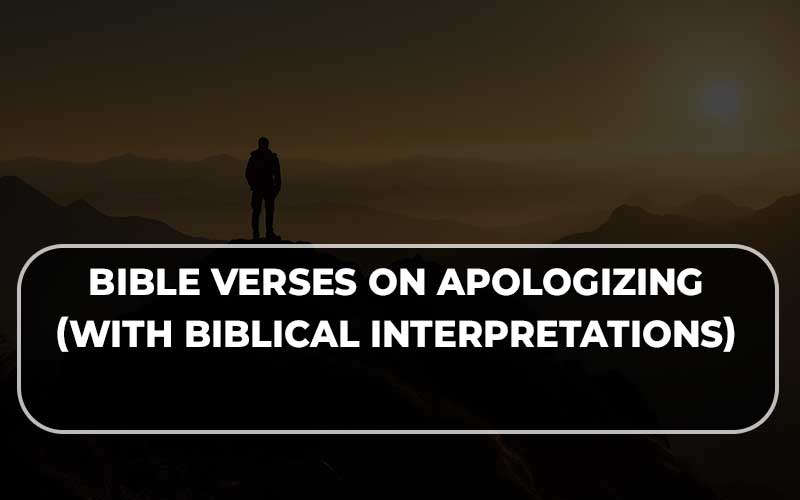Apologizing is a fundamental aspect of human relationships, reflecting humility, forgiveness, and the desire for reconciliation. The Bible provides guidance on the importance of seeking forgiveness and making amends. Here are 30 Bible verses on apologizing, each followed by a 300-word commentary with biblical interpretations.
Bible Verses On Apologizing
Matthew 5:23-24 (NIV):
“Therefore, if you are offering your gift at the altar and there remember that your brother or sister has something against you, leave your gift there in front of the altar. First, go and be reconciled to them; then come and offer your gift.”
In this passage, Jesus emphasizes the priority of reconciliation over religious rituals. True worship involves harmonious relationships. Before presenting offerings to God, one must seek reconciliation with others. This verse underscores the significance of genuine apologies and the restoration of fractured relationships.
Ephesians 4:32 (ESV):
“Be kind to one another, tenderhearted, forgiving one another, as God in Christ forgave you.”
Paul encourages believers to emulate God’s forgiveness in their interactions. By acknowledging God’s mercy, Christians are called to extend the same compassion to others. Apologizing becomes an expression of Christian love, fostering unity within the body of believers.
James 5:16 (NLT):
“Confess your sins to each other and pray for each other so that you may be healed. The earnest prayer of a righteous person has great power and produces wonderful results.”
James highlights the healing power of confession and apology within the Christian community. Honest admission of wrongs fosters spiritual and emotional healing, emphasizing the communal aspect of forgiveness.
Colossians 3:13 (NIV):
“Bear with each other and forgive one another if any of you has a grievance against someone. Forgive as the Lord forgave you.”
Paul emphasizes the Christian duty of forgiveness. As recipients of God’s forgiveness, believers are called to extend the same grace to others. Apologizing becomes an active demonstration of imitating God’s forgiveness in human relationships.
Proverbs 28:13 (NIV):
“Whoever conceals their sins does not prosper, but the one who confesses and renounces them finds mercy.”
The wisdom literature of Proverbs emphasizes the importance of acknowledging wrongdoing. Apologizing is not merely about admitting faults but also involves a sincere turning away from them. Through confession and repentance, one finds the mercy of God, fostering personal growth and spiritual prosperity.
1 John 1:9 (ESV):
“If we confess our sins, he is faithful and just to forgive us our sins and to cleanse us from all unrighteousness.”
John reinforces the idea of confession, highlighting God’s faithfulness in forgiving repentant hearts. Apologizing is an essential aspect of maintaining a close relationship with God, allowing believers to experience the cleansing power of divine forgiveness.
Luke 17:3-4 (NIV):
“So watch yourselves. If your brother or sister sins against you, rebuke them; and if they repent, forgive them. Even if they sin against you seven times in a day and seven times come back to you saying, ‘I repent,’ you must forgive them.”
Jesus provides a clear directive on the cyclical nature of forgiveness. Apologizing is not a one-time event but a continuous process. Forgiveness should be extended generously, mirroring God’s boundless mercy and grace.
2 Corinthians 7:10 (NLT):
“For the kind of sorrow God wants us to experience leads us away from sin and results in salvation. There’s no regret for that kind of sorrow. But worldly sorrow, which lacks repentance, results in spiritual death.”
Paul distinguishes between genuine and superficial sorrow. True apologies involve a godly sorrow that leads to repentance and salvation. Apologizing with a sincere desire for change aligns with God’s redemptive plan for humanity.
Matthew 18:15 (NIV):
“If your brother or sister sins, go and point out their fault, just between the two of you. If they listen to you, you have won them over.”
Jesus provides a step-by-step approach to conflict resolution, underscoring the importance of addressing issues privately. Apologizing begins with a humble and private acknowledgment of wrongdoing, fostering a climate of reconciliation.
Romans 12:18 (ESV):
“If possible, so far as it depends on you, live peaceably with all.”
Paul encourages believers to actively pursue peace. Apologizing is a crucial element in this pursuit, demonstrating a commitment to harmony and reconciliation. Striving for peace involves taking responsibility for one’s actions and seeking forgiveness when necessary.
Galatians 6:1 (NLT):
“Dear brothers and sisters, if another believer is overcome by some sin, you who are godly should gently and humbly help that person back onto the right path. And be careful not to fall into the same temptation yourself.”
Paul emphasizes the communal responsibility for restoration. Apologizing extends beyond personal relationships to the broader Christian community. Believers are called to offer support and correction with humility, fostering a culture of accountability and grace.
Psalm 51:10 (NIV):
“Create in me a pure heart, O God, and renew a steadfast spirit within me.”
King David’s plea for a pure heart reflects the essence of apologizing. It is not just about rectifying external actions but involves a transformation of the heart. Apologizing seeks not only forgiveness but also spiritual renewal and a steadfast commitment to righteousness.
Also Read: Powerful Bible Verses On Eating Meat (With Biblical Interpretations)

